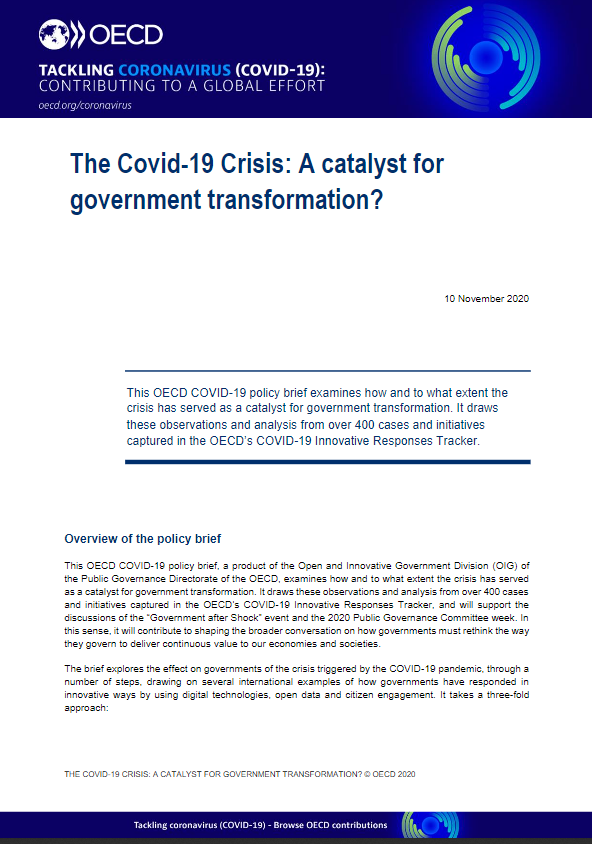The Covid-19 crisis: A catalyst for government transformation?

Overview
This OECD COVID-19 policy brief, a product of the Open and Innovative Government Division (OIG) of the Public Governance Directorate of the OECD, examines how and to what extent the crisis has served as a catalyst for government transformation. It draws these observations and analysis from over 400 cases and initiatives captured in the OECD’s COVID-19 Innovative Responses Tracker, and will support the discussions of the “Government after Shock” event and the 2020 Public Governance Committee week. In this sense, it will contribute to shaping the broader conversation on how governments must rethink the way they govern to deliver continuous value to our economies and societies. The brief explores the effect on governments of the crisis triggered by the COVID-19 pandemic, through a number of steps, drawing on several international examples of how governments have responded in innovative ways by using digital technologies, open data and citizen engagement. It takes a three-fold approach: The Covid-19 Crisis: A catalyst for government transformation?
- Observations of the crisis and how governments have responded. This section explores what has been observed and seen through the crisis in terms of how governments and their partners have responded. What have they done? What does the evidence show us? It explores nine threads of activity seen across government responses, including: i) infection control or tracking measures; ii) strengthening public communication and data sharing; iii) adjusting service delivery to the crisis context; iv) social solidarity and “caremongering”; v) leveraging and redeploying existing resources and solutions; vi) crowdsourcing ideas and solution through open calls, hackathons and other challenge mechanisms; vii) adaptive responses by legislatures; viii) collective learning and sense making; and ix) structural responses and possible longer-term shifts.
- What do these developments signify or suggest? Digging down a level deeper, this section explores what those responses might mean or suggest. What do they highlight or indicate? What do they imply in regards to the workings of government in a crisis? The observations suggest attention to a number of things including: the role of the state; the importance of novel responses; that novel responses do not come out of nowhere; the relevance of digital and data readiness to enable public responses; the additional prominence of the open government, digital and innovation agendas; a shared experience across the system that may shift default expectations; the digital divide and differing manifestations of the same experience; that there were differing governments, different contexts, but common threads; the importance of data as a strategic asset; greater attention to information (and disinformation); the tensions of democratic compromises and digital surveillance; the emergence of short-term responses with an eye turning to the longer term; and recognition that the long-term effects are not yet known.
- Potential implications for government transformation. Finally, this section explores the implications of the preceding analysis. What do these developments mean for the longer-term journey of government transformation and what needs to be given attention if that journey is going to succeed? These implications include a reminder that what is good for a crisis might not be good for all conditions; the importance of communicating through an open government lens; the emergence of new ways of engaging with citizens; the way the crisis can act as both a “living lab” and a booster for government reforms; a need for public sector entities to reassess or rethink existing courses of action; questions around austerity, investment and experimentation; what crises and the innovation determinants reveal about the need for an ongoing engine for questioning and challenging; the contribution of innovation portfolio approaches; and the need for active stewardship.
In short, the crisis can be seen as unlocking significant activity within governments but there are important questions around the sustainability of this and what governments need to do to build a deeper and more entrenched capability to allow for transformation not only in response to a crisis, but a transformation that meets longer-term needs and that fits with the values that governments aspire to. This brief provides some reflections built upon what has been seen so far in order to aid next steps. This brief is by no means definitive or comprehensive. Much has happened during the pandemic and the associated economic and social crisis and there is much yet still to occur, let alone to be understood. This should be seen as an aid to learning and reflection. Given the human and financial costs of the crisis, and its repercussions on the functioning of our democracies, it is vital that governments seek to learn from the experience. The OECD provides a forum for such collective learning by drawing upon the experiences of its member countries and allowing governments to reflect upon the implications, both positive and negative, of such change. It is hoped that this brief can help governments consider the potential of the crisis as a catalyst, if a cruel one, for transformation, so that they can come out of the crisis better than before and continue implementing public sector reforms to shape a more citizen-centred, sustainable future. This brief

The Covid-19 crisis: A catalyst for government transformation?
Published on 28 November 2020.
